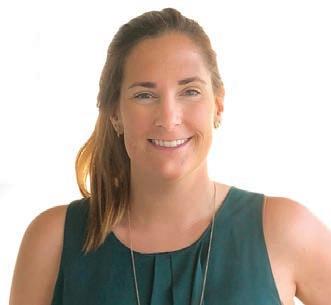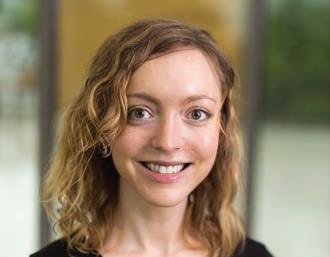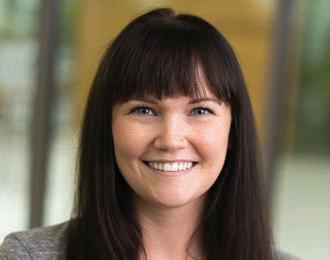
10 minute read
Honors & Awards
Kudos!
Tiffany Baffour Sarah Canham Chris Cambron Jason Castillo Caren Frost Eric Garland
Yvette González Coronado Adam Hanley Jamuna Jones Dena Ned Philip Osteen Cagney Smullin
Associate Professor and MSW Program Director Tiffany Baffour was accepted to the HERS Leadership Institute, a leadership program for women in higher education, for the summer of 2021.
Sarah Canham, associate professor, was awarded a $1.37 million grant from the Social Science and Humanities Research Council of Canada for her research on best practices in shelter and housing for the aging population.
Associate Professor and BSW Program Director Jason Castillo was awarded a HRSA grant as the principal investigator of a project providing substance use disorder education, and will work with two co-investigators, Research Professor Caren Frost and Assistant Professor Chris Cambron. personnel who have undergone knee surgery. Dr. Hanley also received an R21 grant from the NIH-National Institute on Drug Abuse for his study on mindful interoceptive mapping.
The Career and Professional Development Center at the University selected Jamuna Jaehee Yi Jones, director of field education, as a Career Champions Award recipient to honor her impact on student career development.
Associate Professor (Lecturer) Dena Ned was selected as the inaugural associate dean of the Office for First Generation Access in Undergraduate Studies at the University, and will continue teaching in the College while taking on this new role.
Dr. Frost will also serve as the co-investigator on an NIH grant in the U’s Office of Research Integrity, which will examine methods of research and research ethics training.
Associate Dean for Research Eric Garland was named the first distinguished professor of social work at the University, and was appointed to a national expert panel developing a joint guideline of the American Society of Clinical Oncology and the Society for Integrative Oncology. Dr. Garland also presented an invited lecture to the National Institutes of Health on “Healing the Opioid Crisis with Mindfulness-Oriented Recovery Enhancement.” Interim Associate Dean for Academic Affairs Philip Osteen was invited to present his research on flexible work policies and employee mental health at the World Economic Forum, and was named a 2021 Fellow by the Society for Social Work Research in recognition of his contributions, accomplishments, and leadership in social work.
The College announced the winners of the semester-long One College Award, recognizing Associate Director of Education Cagney Smullin in the fall for her work in transitioning to online learning, and Assistant Professor (Clinical) Yvette González Coronado in the spring for her advocacy for student well-being.
Additionally, Dr. Garland and Assistant Professor Adam Hanley were awarded a $5 million grant from the Department of Defense to conduct mindfulness research with military Jaehee Yi, associate professor, was accepted as a member of the first Social Work Health Futures Lab to learn how to study trends, forecast futures, and amplify the impact of social work.
PhD Candidate Joins Global Network of Human Trafficking Experts
Last fall, a multidisciplinary human trafficking network, HEAL—Health, Education, Advocacy, and Linkage—put out a call for a diverse group of stakeholders with trafficking expertise to help create policy guides. College of Social Work PhD candidate Kwynn Gonzalez-Pons read the call and was immediately interested. With her years of work experience with trafficking prevention nonprofits and her academic background in public health, she thought she could bring know-how from several related fields to the project. HEAL’s selection committee agreed— Mrs. Gonzalez-Pons applied and was accepted as part of a working group tasked with expanding a United Nations global knowledge platform. The ultimate goal was for this group of stakeholders to combine professional expertise with databacked research to come up with justice policy guides—lists of research-based best practices that government officials could use to make more informed decisions about how to address trafficking and labor issues within their jurisdictions. The work involved analyzing peer-reviewed and gray literature, and applying a confidence score to their findings (low, medium, high confidence). Mrs. Gonzalez-Pons reflected, “It was a really cool experience to work with people from different parts of the world and feel like my work would have an impact. I appreciated that each working group included and solicited feedback from trafficking survivors. It was important to learn from them and support them in a data-driven way.”
Kwynn Gonzalez-Pons
Meet the Postdocs
“My interest in substance use and mindfulness research,” said Anna Parisi, “stems from over five years of clinical experience working in community mental health settings with individuals struggling with substance use disorders and criminal justice involvement.” As a new postdoctoral research associate in the College’s Center on Mindfulness and Integrative Health Intervention Development (C-MIIND), she explained she chose the U because of “the innovative and groundbreaking research that it is being done to advance social justice and well-being through centers such as C-MIIND.” After earning her MSW and PhD in social work from the University of North Carolina at Chapel Hill, Dr. Parisi admitted, “The close proximity to the mountains was also another huge draw!” A licensed clinical social worker, she is deepening her understanding of Mindfulness-Oriented Recovery Enhancement (MORE) as a practitioner, while also using her experience as a researcher to advance knowledge around the ways mindfulness-based interventions can facilitate recovery and promote healing from substance use disorder. “I’m currently engaged in a fantastic mix of clinical work, data analysis, and paper writing,” she reports. With experience in behavioral health, cardiovascular measurement, neuroimaging, and EEG, Lynae Roberts was ready to hit the ground running when she joined C-MIIND as a new postdoctoral research associate. While earning her master’s and PhD in psychology from Baylor University in Waco, Texas, Dr. Roberts studied mind-body interventions, including mindfulness, clinical hypnosis, and music therapy, focusing on the psychophysiological mechanisms and clinical applications of the treatments. “Overall,” said Dr. Roberts, “my research focuses on the connections between cognition, emotion, behavior, and physiology, and the ways in which these biopsychosocial connections can be enhanced to manage symptoms or to promote health.” Realizing her research interests and experience aligned exceptionally well with the work happening within C-MIIND, Dr. Roberts recalled, “I was ecstatic to discover this postdoctoral opportunity and knew I wanted to be a part of Dr. Garland’s research team.”


Dean Teasley Named as Associate Provost
In October, University of Utah President Taylor Randall announced the appointment of the College of Social Work’s Dean Martell Teasley as the associate provost and special assistant to the senior vice president for academic affairs (provost).
“We are grateful for Dr. Teasley’s willingness to take on this new role in addition to his continuing duties as dean of the College of Social Work,” wrote
President Randall and Dan Reed, senior vice president for academic affairs, in a joint message.
In this newly-established position, Dean Teasley will assist the U’s colleges with strategic planning; review, revise, and develop University-wide policies related to academic freedom and freedom of expression; and assist in the leadership and implementation of other strategic projects.
Dean Teasley has served as dean of the University of Utah College of Social Work since 2017, and is currently serving his second term as president of the National Association of Deans and Directors of
Schools of Social Work. Before coming to Utah, he served as a professor and chair of the social work program at the University of Texas at San Antonio; he also taught at Florida State University, where he chaired the Social Work and Disaster Recovery Program. Dean Teasley served a tour of duty as a licensed practical nurse with the U.S. Army in the first Gulf War; his service not only helped him develop leadership skills that he has utilized throughout his career, but also supported his academic pursuits. He graduated magna cum laude with bachelor’s degrees in sociology and psychology from Fayetteville State University, then earned a Master of Social Work degree, with an emphasis in planning and administration, from Virginia Commonwealth University. Dean Teasley earned his PhD in social work from Howard University, where he focused on African American adolescent development.
“Dr. Teasley has established himself as an effective leader with the ability to articulate and implement his vision,” wrote President Randall and Senior Vice President Reed. “We look forward to Dr. Teasley bringing his considerable talents and skills to this position in support of the greater University.”
Since coming to the U, Dean Teasley has established himself as an effective leader with the ability to articulate and implement his vision.

Fall semester, our BSW and MSW students can be found online in Florida, Georgia, Illinois, Kentucky, Massachusetts, New York, North Carolina, Ohio, and Utah

The Future of Education is Online
In March of 2020—the year the word “unprecedented” became trite—schools around the world did something truly remarkable and transitioned from face-to-face learning to fully-online learning in a matter of days. “The pandemic shook people up and they had to move online while operating in crisis mode,” said Cynthia Sanders, the inaugural director of online programs at the College of Social Work.
The resulting online courses were sufficient in the moment. And the experience, abrupt as it might have been, gave nearly everyone in higher education an opportunity to expand their view of the potential to learn and teach online. But now, with the luxury of time and online-savvy faculty, we can do better, said
Dr. Sanders. “We’re not just building individual online courses as we did during the pandemic; we’re developing a whole program, a whole quality experience for our online students.” With online programs, she said, instructors need to think about how to engage students differently than they would face-to-face, how classes tie together, and what resources need to be available, among many other considerations. “I think online education has come a long way,” she said. “There are models and best practices and ways you can get really creative, even asynchronously.”
To help faculty tap into their creativity and utilize known best practices, Dr. Sanders is collaborating with technology experts and instructional designers to help CSW faculty translate their in-person classes into engaging and productive online experiences.
She is clear about the goal: “We want to have highquality online programs that are equivalent in nature to our onsite programs in terms of rigor, excellence, outcomes, and competency achievement.”
One of Dr. Saunders’ other big goals for the online programs is to expand access to higher education, especially in parts of the state where prospective students might not otherwise have opportunities for higher education. “There’s a shortage of social workers in the state,” said Dr. Sanders. “There are parts of the state that literally have no social workers.” Yet these geographic areas are exactly where social workers are most needed … and where earning a BSW or MSW through online education might be the best option. The greater accessibility offered by online education can also open up possibilities for students who need more flexibility in scheduling, in class format, and in physical elements of participating in classes.
The bottom line: the College’s online BSW and MSW Programs can help educate more social workers in underserved areas, resulting in increased service availability in these areas.
Dr. Sanders noted that one barrier standing in the way of reaching this goal is “the digital divide”—the lack of high-speed internet (or any internet at all) in some rural communities, thus preventing access to online courses. “The pandemic helped highlight the digital divide, so you saw a lot of states, cities, and communities take steps to provide funding to increase internet access and reduce the digital divide,” said Dr. Sanders. “Hopefully that will continue post-pandemic.”
“We are, in many ways, still in the beginning of online education,” she said. But she is excited to address the challenges as she works toward her goals. “There’s lots of work to be done and lots of good things for me to do in Utah.”
The first cohort of online Advanced Standing MSW students will begin classes in May of 2022

You can tell from the stickers on her water bottles—Cynthia Sanders loves the outdoors, and loves exploring them with her two rescue dogs, Australian Shepherds Ardie and Amos. She grew up in Salt Lake City and earned two bachelor’s degrees and her MSW from the U before moving to St. Louis to earn her PhD in social work from Washington University. “I always had the intention of moving back west,” she said. She accepted a faculty position at Boise State University, where she spent the next 17 years before returning to the U. “It’s exciting for me to be able to come back here, for both personal and professional reasons,” she said. In addition to being closer to family (and collecting new stickers from local coffee shops and craft beer breweries), she is looking forward to new opportunities for collaboration around her research area: asset-based welfare policies and programming and financial capability among low-income groups.





